Elder Cook: Four Ways Missionaries Can Love Others and Deepen Their Conversion
Contributed By Sarah Jane Weaver, Church News editor
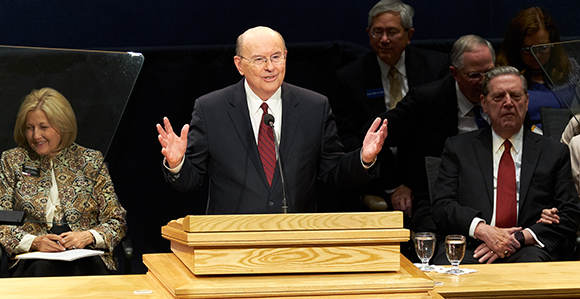
Elder Quentin L. Cook addresses missionaries during a devotional held as part of the 2018 Mission Leadership Seminar at the Provo MTC on Sunday, June 24, 2018, which was broadcast around the world to the Church’s 14 missionary training centers.
Article Highlights
- Love companions, the people you serve, the mission president and his wife, and the Lord Jesus Christ.
- Deepen conversion through gospel knowledge, promptings, seeing the Atonement at work, and consecration.
“Diligent prayerful study and extraordinary effort to find and teach the elect brings spiritual understanding and blessings that make a mission so seminal that it results in a deep, lasting conversion.” —Elder Quentin L. Cook of the Quorum of the Twelve Apostles
Missionaries should embrace the “four loves of missionary work” by loving their companions, the people where they are called to serve, their mission president and his wife, and the Lord Jesus Christ, said Elder Quentin L. Cook on Sunday, June 24.
“My purpose this evening is to address four broad relationships that I believe should be of particular importance to you as you are commencing your consecrated service as emissaries of our Lord and Savior Jesus Christ,” Elder Cook explained.
Speaking during an MTC devotional held as part of the 2018 Mission Leadership Seminar, Elder Cook addressed the topic “Act in a Consecrated Fashion—Love God and Love Others.” The talk, during which Elder Cook also shared four ways to deepen conversion, was broadcast around the world to the Church’s 14 missionary training centers.
Elder Cook asked the capacity audience in the Church’s Provo Missionary Training Center to identify the Church by its correct name: The Church of Jesus Christ of Latter-day Saints.
He explained that in 1838 the Lord instructed the Prophet Joseph Smith: “For thus shall my church be called in the last days, even The Church of Jesus Christ of Latter-day Saints” (Doctrine and Covenants 115:4).
“After providing the full name of the Church in a gospel conversation with those you will teach, it may be appropriate to refer to the Church as the Church of Jesus Christ,” said Elder Cook. “What is important in this regard is that we avoid identifying the Savior’s Church as the LDS Church or Mormon Church.”
Elder Cook said that President Russell M. Nelson taught, “While we have no control over what other people may call us, we cannot call ourselves by any other than the name as prescribed by the Lord: The Church of Jesus Christ of Latter-day Saints.”
1. Love your companions
It is essential as an emissary of the Savior to “be one” in unity and harmony, said Elder Cook.
“The challenge is to love those [who] don’t have the same interests and are different in many ways from yourself,” he said.
Elder Cook said he learned from each companion and feels to this day that each one of them “was an inspired assignment by the mission president to accomplish the Lord’s purposes.”
One of Elder Cook’s companions was Elder Jeffrey R. Holland of the Quorum of the Twelve Apostles. “We had a great mission experience and share a great love and unity that has endured in a marvelous way over the 56 years since we served together.”
%20(2).jpg)
President T. Bowring Woodbury and his wife, Sister Beulah Woodbury, pose for photograph with missionaries in the British Mission, including Elder Jeffrey R. Holland and Elder Quentin L. Cook.
Elder Cook shared an experience he had with another junior companion, now deceased. The young man had grown up on a farm far from a major city. The farm, devastated by drought years, was in foreclosure. Because the young man’s parents could not afford to send him on a mission, his older sister gave up her scholarship to BYU and became a legal secretary to support her brother so he could serve in the British Mission.
“I will never forget the first evening we were together and the spiritual impact of his tender prayer. … He was serving for all the right reasons, and his gratitude to his sister and the Lord was inspiring.”
At that point this young elder didn’t know the lessons very well; Elder Cook did most of the teaching. “But whether it was in praying or testifying, the witness of the Holy Ghost was so powerful and the impact on investigators was so strong that there were many conversions.”
To the missionaries, he said, “Please know that your testimony and witness can have that kind of impact from the first day you arrive in the field.”
When Elder Cook’s companion returned from his mission, he went to work and supported that sister, so she could serve a mission. “She was called to the British Mission and served in the same central London area where we had served.”
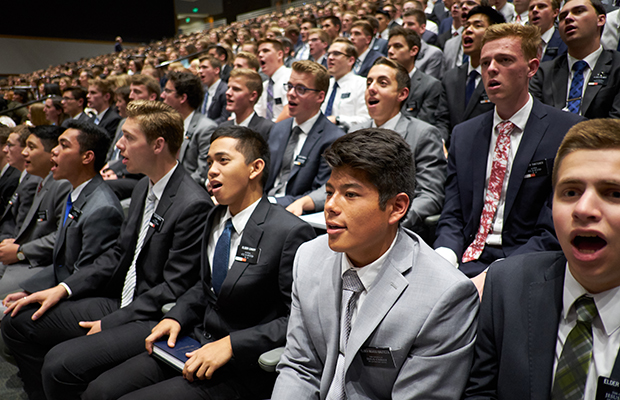
Missionaries sing a hymn during an MTC devotional address by Elder Quentin L. Cook held as part of the 2018 Mission Leadership Seminar on Sunday, June 24, 2018, which was broadcast around the world to the Church’s 14 missionary training centers.
2. Love the people
For most missionaries, there is an appreciation and love for the people they are called to serve, said Elder Cook. “This love is deep and abiding; it will last your entire life,” he said. “Your interest will be so great that it will inspire you even in educational, language, and occupational choices.”
Elder Cook also cautioned the missionaries: “One source of humor in teenage years and in schools is to make fun of people and circumstances in which they live,” he said. “Emissaries of the Savior who are trying to develop Christlike attributes do not make fun of other people, or put them down, or attempt to create humor at their expense.
“Social media and newspapers are full of this approach. It is not worthy conduct. It is wrong. Don’t do it.”
Be determined to love the people, he said. “They are our brothers and sisters and beloved children of our Father in Heaven.”
3. Love the mission president and his companion
Elder Cook said it is important for missionaries to know that President Russell M. Nelson called them to serve as a missionary. He delegated a member of the Quorum of the Twelve Apostles to assign them to a mission.
“I want you to know that in this sacred responsibility we often have the impression that we are assigning missionaries to a mission president and his companion/wife,” said Elder Cook. “We have the sense that these mission leaders will bless you during your mission.”
Elder Cook shared a photograph of Elder Holland and himself with Elder Marion D. Hanks, their second mission president.
“He was particularly concerned that we learn the doctrine and teach by the Spirit,” recalled Elder Cook. “Because we were more senior in the mission when he came, we had the blessing of working more closely with him. His influence has been profound in the lives of all of his missionaries. He also emphasized the Book of Mormon, the doctrine contained therein, and its significance as a witness of Jesus Christ.”
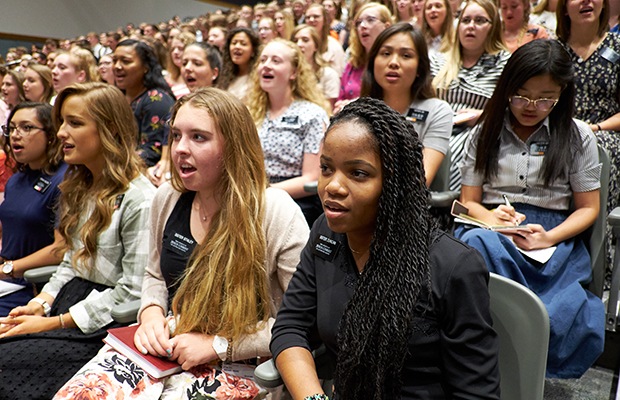
Missionaries sing a hymn during an MTC devotional address by Elder Quentin L. Cook held as part of the 2018 Mission Leadership Seminar on Sunday, June 24, 2018, which was broadcast around the world to the Church’s 14 missionary training centers.
4. Love the Lord
Elder Cook said the most important love for missionaries is to love the Lord.
“Our commitment and consecration is to serve Him with all our ‘heart, might, mind and strength’ (Doctrine and Covenants 4:2),” he said.
“We show our love for the Savior when we magnify our callings, and my testimony to you is that as you labor diligently to magnify your mission callings, your personal conversion can deepen,” he said. “It is my experience that spiritual impressions and even revelation come more often when we are serving and blessing other people. … As we labor diligently to magnify our calling, our conversion can be deepened.”
Elder Cook listed four ways to deepen conversion—to deepen gospel knowledge, receive spiritual promptings, see the Savior’s Atonement work in the lives of others, and act in a consecrated fashion.
1. Deepen gospel knowledge and understand principles.
“When Preach My Gospel was being prepared, President Gordon B. Hinckley instructed President M. Russell Ballard, who was then chairman of the Missionary Executive Council, and Elder Cook, then serving as Executive Director of the council, to make sure that all of the doctrine revealed to the Prophet Joseph Smith would be included in the manual.
“He particularly emphasized chapter 3 and wanted it written so that it would not be memorized,” Elder Cook recalled. “President Hinckley’s instruction was that missionaries should study and learn the concepts, but these should not be taught by rote presentation. The missionaries should feel free to use their own words as prompted by the Spirit.”
Elder Cook said President Hinckley wanted the missionaries to return home at the end of their missions with deep and abiding conversions. “He particularly desired that they would use this doctrinal knowledge to bless their own families.”
Elder Cook also issued a “gentle caution” to the missionaries. “When missionaries are more concerned about their personal knowledge and development than bringing souls to Christ and use time that should be devoted to finding, teaching, and baptizing, they will not have the same spiritual experiences,” he said.
“I have found that most significant spiritual experiences occur when we are helping and serving others and accomplishing the Lord’s purpose. Diligent prayerful study and extraordinary effort to find and teach the elect brings spiritual understanding and blessings that make a mission so seminal that it results in a deep, lasting conversion.”
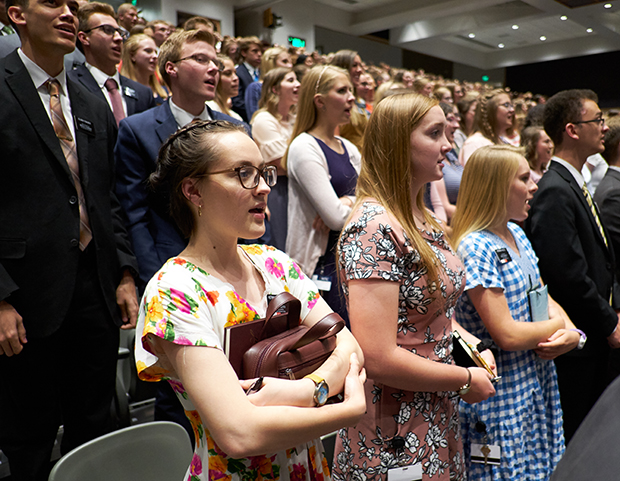
Missionaries sing a hymn during an MTC devotional address by Elder Quentin L. Cook held as part of the 2018 Mission Leadership Seminar on Sunday, June 24, 2018, which was broadcast around the world to the Church’s 14 missionary training centers.
2. Witness the hand of the Lord and receive spiritual promptings
During his mission, Elder Cook was assigned to a new city that had never had missionaries. With his companion, he fasted and prayed.
“Early in the morning, immediately after we arrived in our new area, we biked up to a hill. … We prayed that we would be able to find people to teach. We specifically prayed that we could find elect individuals who could be the leaders of what we desired would become a new branch.”
Before going to the hill, Elder Cook had felt his task was almost overwhelming. Afterward, he felt they would be assisted by heavenly power. Soon the companionship, led by the Spirit, found people to teach and watched the Lord commence to establish His work.
“Witnessing the hand of the Lord, receiving spiritual promptings, and feeling God work through His missionary servants establishes the missionary experience as seminal in the life of almost all missionaries,” he said.
3. See the Savior’s Atonement work in other lives.
Elder Cook said one of the great blessings of being a missionary is to witness the impact of repentance and the Savior’s Atonement on the lives of those who are taught.
“One of the reasons that the Savior’s Atonement is not appreciated in the world at large is because much of society takes the position that a loving Father in Heaven should exact no consequences for conduct that is contrary to His commandments.”
Seen in their true light, the glorious blessings of repentance and adherence to the Savior’s teachings are monumentally important, he said.
“It is not unfair to be clear, as Alma was with Corianton, about the consequences of sinful choices and lack of repentance,” said Elder Cook. “Missionaries have an incredible role in not only teaching repentance but also in teaching the significance of the Savior’s Atonement. …
“When you invite those you teach to repent, you are assisting them in having the Savior’s Atonement work in their lives.”
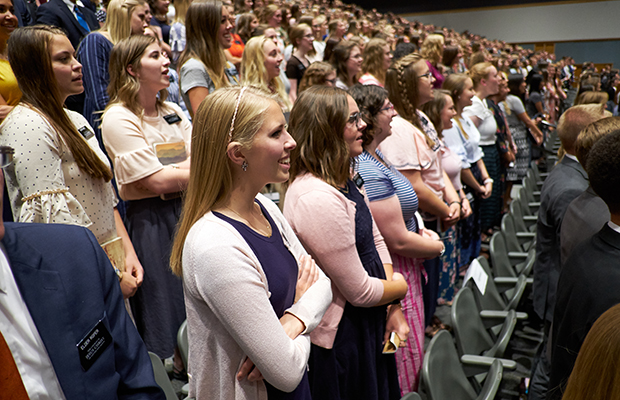
Missionaries sing a hymn during an MTC devotional address by Elder Quentin L. Cook held as part of the 2018 Mission Leadership Seminar on Sunday, June 24, 2018, which was broadcast around the world to the Church’s 14 missionary training centers.
4. Act in a consecrated fashion.
Consecration has eternal significance in missionary work, said Elder Cook.
“Your acceptance of the call to serve and your willingness to go anywhere in the world to preach His gospel is profound evidence of your consecration and is a source of inspiration to all the members of the Church,” he said. “Please know you have our appreciation, our prayers, and our blessing and our love as you commence this sacred service.”
Read additional stories
President Nelson Shares the “Hopes of My Heart” with New Mission Leaders
Love, Serve, Teach, Baptize, Elder Uchtdorf Tells New Mission Leaders
Book of Mormon Is the Most Effective Conversion Tool, Say Elder and Sister Holland
President Oaks Says Knowledge, Testimony of Joseph Smith Vital to Missionary Work
Repentance Is Not a Backup Plan; It Is the Plan, Says Elder Andersen
